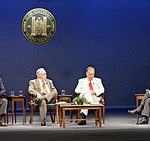Three North Carolina journalists and Bill Friday, president emeritus of the University of North Carolina, discussed the media's role in covering news and serving the community during a Sept. 5 panel discussion in McCrary Theatre. Details...
 Horace Carter of the Tabor City Tribune, Rolfe Neill of The Charlotte Observer and Frank Daniels, Jr., of The News and Observer in Raleigh, joined Friday for “The North Carolina Newspaper and the Obligation to Public Service.” Their newspapers received the Pulitzer Prize for Public Service for their coverage of important community issues. The panel covered a variety of topics during a lively 80-minute discussion of the media and the delicate balance between reporting the news and service to the community.
Horace Carter of the Tabor City Tribune, Rolfe Neill of The Charlotte Observer and Frank Daniels, Jr., of The News and Observer in Raleigh, joined Friday for “The North Carolina Newspaper and the Obligation to Public Service.” Their newspapers received the Pulitzer Prize for Public Service for their coverage of important community issues. The panel covered a variety of topics during a lively 80-minute discussion of the media and the delicate balance between reporting the news and service to the community.
“Public service is defined by the person who is doing it,” said Neill, who served as publisher of The Charlotte Observer from 1975-1988. The newspaper received a Pulitzer in 1988 for uncovering misuse of funds by the PTL television ministry, which led to the downfall of TV evangelist Jim Bakker. Neill said newspapers have a duty to spotlight areas of injustice, waste and misconduct if they are to fulfill their obligation of public service, even in the face of possible lawsuits and community backlash. “You always are going to incur a certain price, sometimes at the cash register, sometimes in friendships …. If you do your work well and don’t fire until you have your facts, you won’t have much problem with lawsuits.”
Carter agreed, saying that the benefits of reporting about the Ku Klux Klan’s activities in Columbus County in the 1950s were worth the personal threats and alienation he suffered because of his coverage. The Tribune became the first weekly paper in the country to win the Pulitzer Prize for Public Service in 1953 for its hard-hitting editorials denouncing the Klan. “It’s amazing how little support we had from the community. Merchants were afraid they’d lose business (if they advertised with the Tribune), and the Grand Dragon came to see me twice and said they were going to put me out of business.” But Carter remained convinced that maintaining pressure on the Klan was the right thing to do. “I said at the time, ‘This we’ve got to fight, because these are a vigilante people, and we can’t have vigilante people running the country.'”
Solid reporting on the state legislature led to the News & Observer’s Pulitzer Prize-winning series on the dangers of hog waste in eastern North Carolina in 1996, said Daniels, who published the paper from 1971-1996. Well known for his commitment to civic journalism and upholding public access to government meetings and records, Daniels said “state government is the story in Raleigh. The key to covering the legislature is good solid reporting. You have to know the clerks, the legislators, the lawyers, the people who write the bills” to effectively cover legislative matters.
That coverage, Daniels said, led to the series on hog waste. “The laws were changed in the 80s which changed the way hog farms were regulated” in North Carolina. Those changes gave the newspaper access to hog farm records that were previously restricted. The paper found that the rapid expansion of the hog industry in North Carolina, through tax breaks and favorable laws, resulted in a growing list of environmental problems the industry was slow to address.
Neill said newspapers face a series of challenges, including dwindling subscription numbers. “We are unable, generally, to entice young people to buy a newspaper,” said Neill, citing the availability of instant news on the Internet as a primary competitor. Neill said just over 60 percent of the homes in Charlotte receive the Sunday edition of the Observer, compared with 75 percent as little as 10 years ago.
The discussion was videotaped by WUNC-TV and is tentatively scheduled to be broadcast in November.


